Comprehensive Analysis: Theories and Models in Education Unit 502
VerifiedAdded on 2023/06/10
|19
|6521
|185
Report
AI Summary
This report provides a comprehensive analysis of various theories and models relevant to learning, teaching, and assessment. It covers learning theories such as procedural vs. declarative knowledge and Gagne's skill development theory, along with principles of learning that enhance student-teacher connections and active learning. The report examines models of learning preferences, including Kolb's learning styles, Honey and Mumford's learning styles, and Gregorc's mind styles, emphasizing the importance of identifying and accommodating individual learning preferences for inclusive education. It also delves into communication theories like transactional analysis, interactive, linear, and institutional models, highlighting their implementation in teaching and assessment. Furthermore, the report explores assessment theories and their application in evaluating learning outcomes, theories and models of curriculum development, and theories and models of reflection and evaluation for reviewing teaching practices. The goal is to enhance the understanding and application of these theories and models to improve educational practices and learner outcomes. Desklib provides a platform for students to access past papers and solved assignments for further assistance.
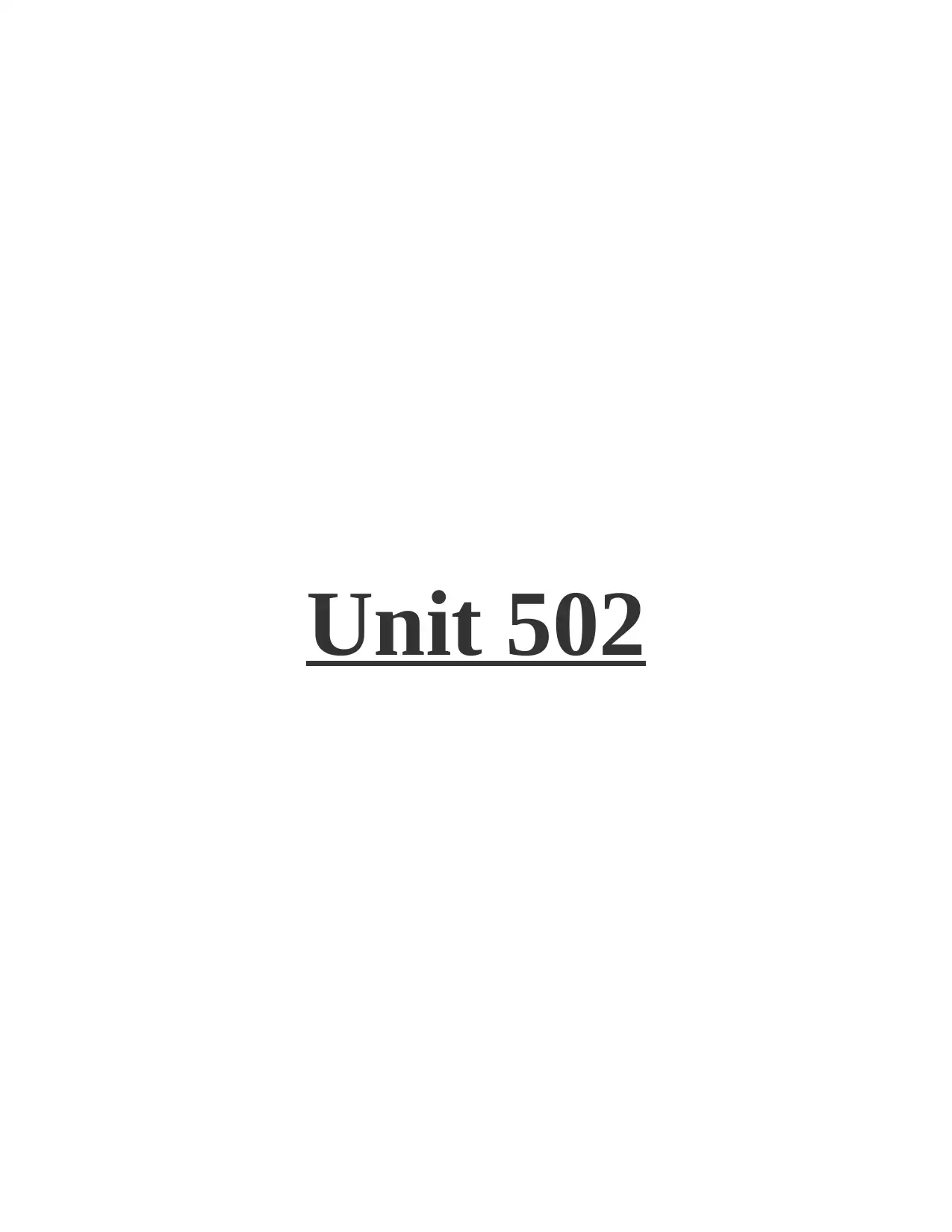
Unit 502
Paraphrase This Document
Need a fresh take? Get an instant paraphrase of this document with our AI Paraphraser
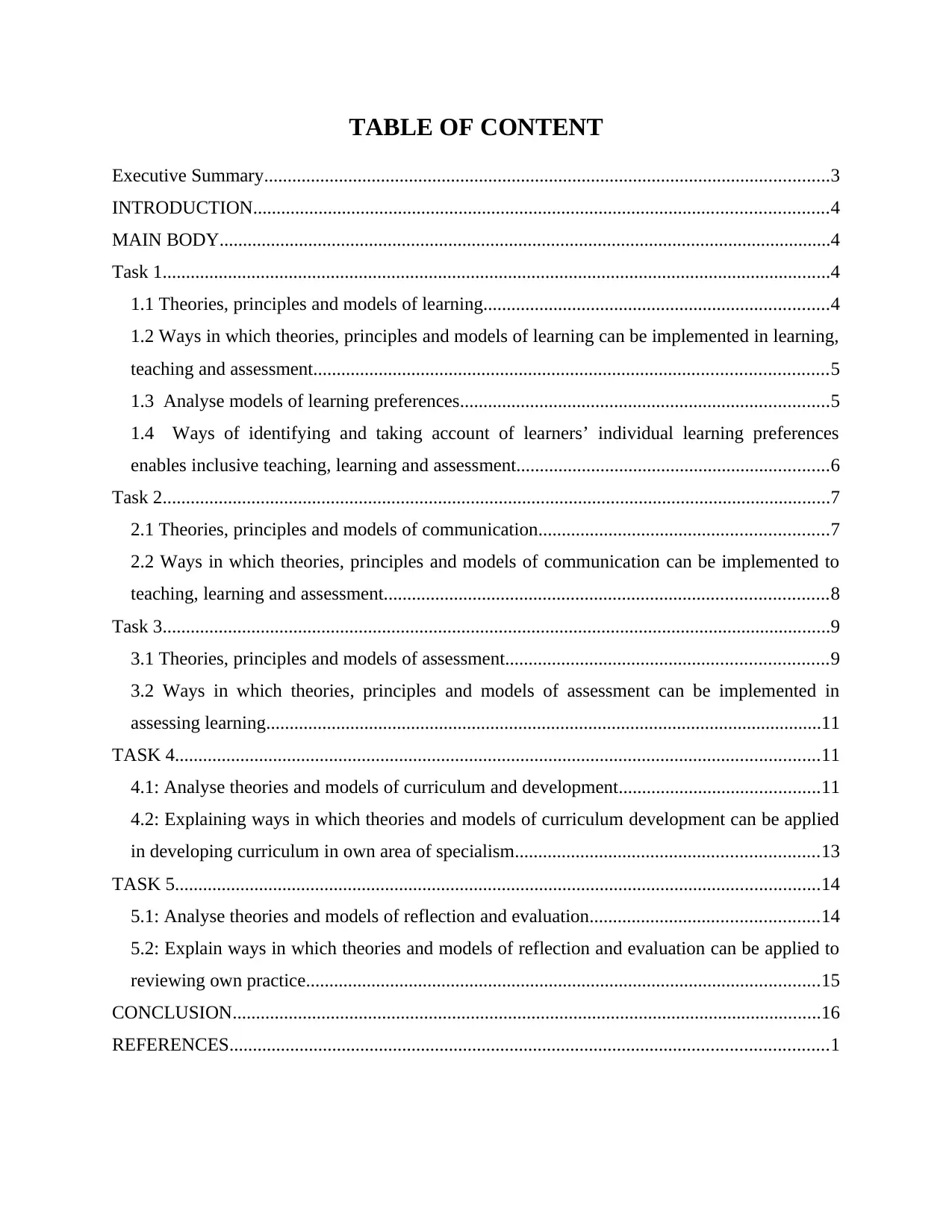
TABLE OF CONTENT
Executive Summary.........................................................................................................................3
INTRODUCTION...........................................................................................................................4
MAIN BODY...................................................................................................................................4
Task 1...............................................................................................................................................4
1.1 Theories, principles and models of learning..........................................................................4
1.2 Ways in which theories, principles and models of learning can be implemented in learning,
teaching and assessment..............................................................................................................5
1.3 Analyse models of learning preferences...............................................................................5
1.4 Ways of identifying and taking account of learners’ individual learning preferences
enables inclusive teaching, learning and assessment...................................................................6
Task 2...............................................................................................................................................7
2.1 Theories, principles and models of communication..............................................................7
2.2 Ways in which theories, principles and models of communication can be implemented to
teaching, learning and assessment...............................................................................................8
Task 3...............................................................................................................................................9
3.1 Theories, principles and models of assessment.....................................................................9
3.2 Ways in which theories, principles and models of assessment can be implemented in
assessing learning.......................................................................................................................11
TASK 4..........................................................................................................................................11
4.1: Analyse theories and models of curriculum and development...........................................11
4.2: Explaining ways in which theories and models of curriculum development can be applied
in developing curriculum in own area of specialism.................................................................13
TASK 5..........................................................................................................................................14
5.1: Analyse theories and models of reflection and evaluation.................................................14
5.2: Explain ways in which theories and models of reflection and evaluation can be applied to
reviewing own practice..............................................................................................................15
CONCLUSION..............................................................................................................................16
REFERENCES................................................................................................................................1
Executive Summary.........................................................................................................................3
INTRODUCTION...........................................................................................................................4
MAIN BODY...................................................................................................................................4
Task 1...............................................................................................................................................4
1.1 Theories, principles and models of learning..........................................................................4
1.2 Ways in which theories, principles and models of learning can be implemented in learning,
teaching and assessment..............................................................................................................5
1.3 Analyse models of learning preferences...............................................................................5
1.4 Ways of identifying and taking account of learners’ individual learning preferences
enables inclusive teaching, learning and assessment...................................................................6
Task 2...............................................................................................................................................7
2.1 Theories, principles and models of communication..............................................................7
2.2 Ways in which theories, principles and models of communication can be implemented to
teaching, learning and assessment...............................................................................................8
Task 3...............................................................................................................................................9
3.1 Theories, principles and models of assessment.....................................................................9
3.2 Ways in which theories, principles and models of assessment can be implemented in
assessing learning.......................................................................................................................11
TASK 4..........................................................................................................................................11
4.1: Analyse theories and models of curriculum and development...........................................11
4.2: Explaining ways in which theories and models of curriculum development can be applied
in developing curriculum in own area of specialism.................................................................13
TASK 5..........................................................................................................................................14
5.1: Analyse theories and models of reflection and evaluation.................................................14
5.2: Explain ways in which theories and models of reflection and evaluation can be applied to
reviewing own practice..............................................................................................................15
CONCLUSION..............................................................................................................................16
REFERENCES................................................................................................................................1
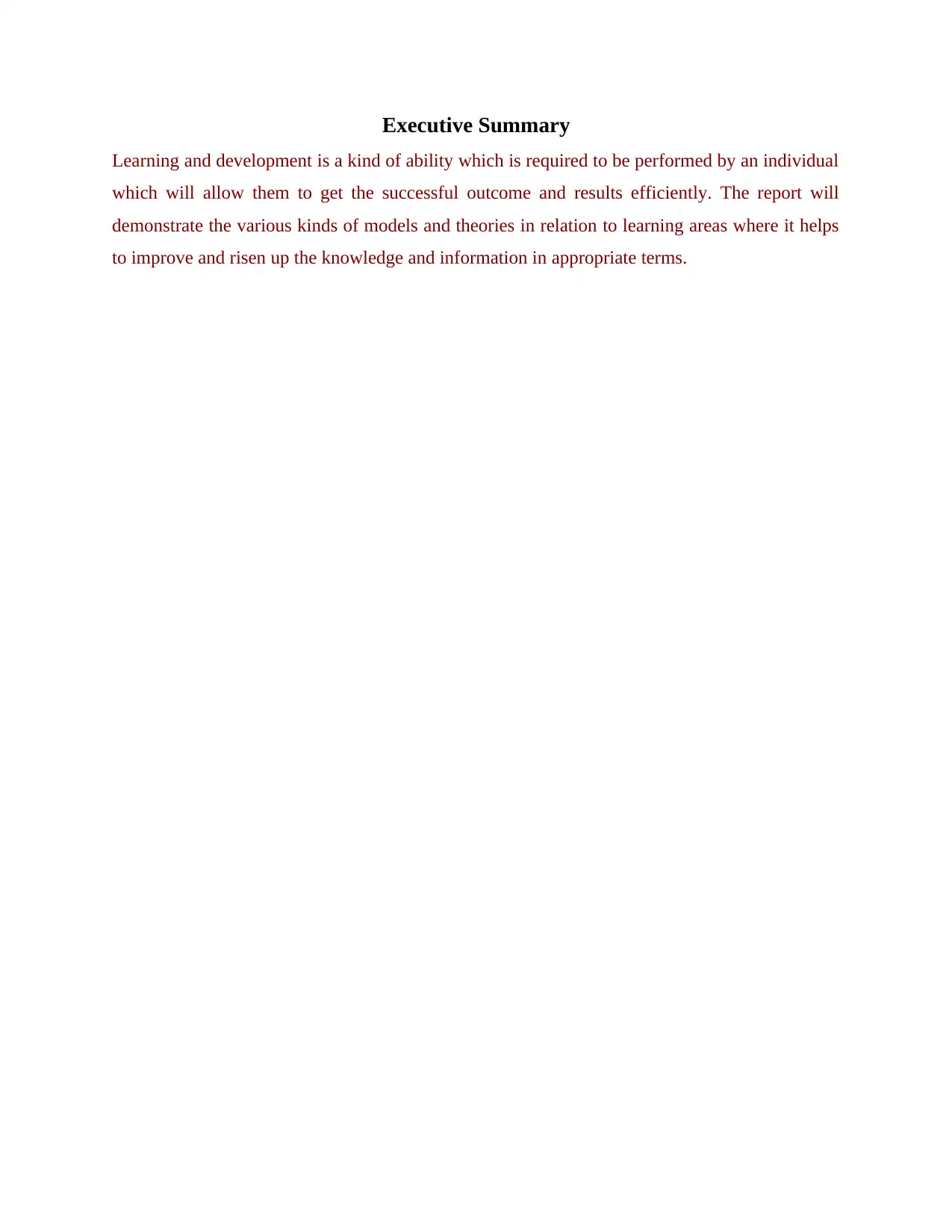
Executive Summary
Learning and development is a kind of ability which is required to be performed by an individual
which will allow them to get the successful outcome and results efficiently. The report will
demonstrate the various kinds of models and theories in relation to learning areas where it helps
to improve and risen up the knowledge and information in appropriate terms.
Learning and development is a kind of ability which is required to be performed by an individual
which will allow them to get the successful outcome and results efficiently. The report will
demonstrate the various kinds of models and theories in relation to learning areas where it helps
to improve and risen up the knowledge and information in appropriate terms.
⊘ This is a preview!⊘
Do you want full access?
Subscribe today to unlock all pages.

Trusted by 1+ million students worldwide
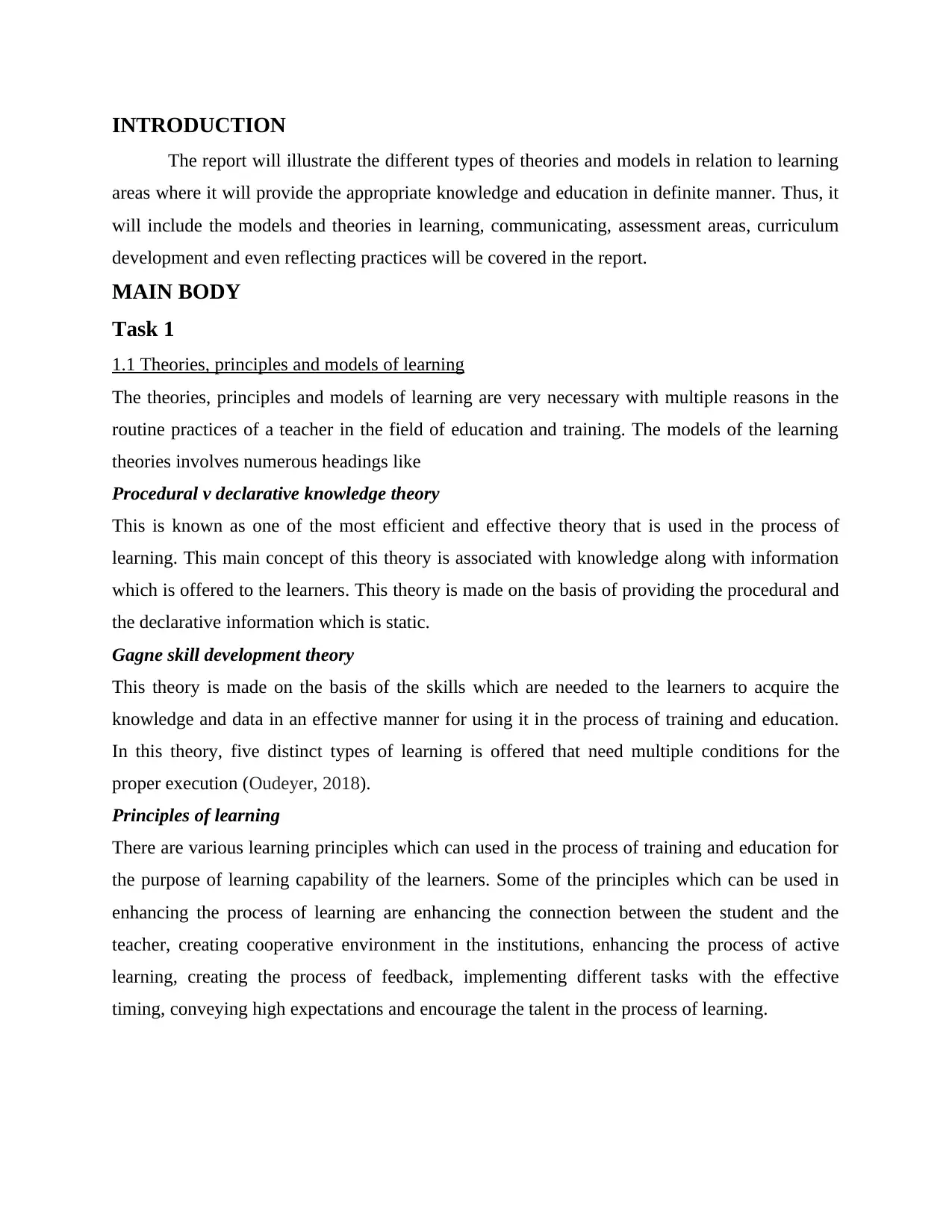
INTRODUCTION
The report will illustrate the different types of theories and models in relation to learning
areas where it will provide the appropriate knowledge and education in definite manner. Thus, it
will include the models and theories in learning, communicating, assessment areas, curriculum
development and even reflecting practices will be covered in the report.
MAIN BODY
Task 1
1.1 Theories, principles and models of learning
The theories, principles and models of learning are very necessary with multiple reasons in the
routine practices of a teacher in the field of education and training. The models of the learning
theories involves numerous headings like
Procedural v declarative knowledge theory
This is known as one of the most efficient and effective theory that is used in the process of
learning. This main concept of this theory is associated with knowledge along with information
which is offered to the learners. This theory is made on the basis of providing the procedural and
the declarative information which is static.
Gagne skill development theory
This theory is made on the basis of the skills which are needed to the learners to acquire the
knowledge and data in an effective manner for using it in the process of training and education.
In this theory, five distinct types of learning is offered that need multiple conditions for the
proper execution (Oudeyer, 2018).
Principles of learning
There are various learning principles which can used in the process of training and education for
the purpose of learning capability of the learners. Some of the principles which can be used in
enhancing the process of learning are enhancing the connection between the student and the
teacher, creating cooperative environment in the institutions, enhancing the process of active
learning, creating the process of feedback, implementing different tasks with the effective
timing, conveying high expectations and encourage the talent in the process of learning.
The report will illustrate the different types of theories and models in relation to learning
areas where it will provide the appropriate knowledge and education in definite manner. Thus, it
will include the models and theories in learning, communicating, assessment areas, curriculum
development and even reflecting practices will be covered in the report.
MAIN BODY
Task 1
1.1 Theories, principles and models of learning
The theories, principles and models of learning are very necessary with multiple reasons in the
routine practices of a teacher in the field of education and training. The models of the learning
theories involves numerous headings like
Procedural v declarative knowledge theory
This is known as one of the most efficient and effective theory that is used in the process of
learning. This main concept of this theory is associated with knowledge along with information
which is offered to the learners. This theory is made on the basis of providing the procedural and
the declarative information which is static.
Gagne skill development theory
This theory is made on the basis of the skills which are needed to the learners to acquire the
knowledge and data in an effective manner for using it in the process of training and education.
In this theory, five distinct types of learning is offered that need multiple conditions for the
proper execution (Oudeyer, 2018).
Principles of learning
There are various learning principles which can used in the process of training and education for
the purpose of learning capability of the learners. Some of the principles which can be used in
enhancing the process of learning are enhancing the connection between the student and the
teacher, creating cooperative environment in the institutions, enhancing the process of active
learning, creating the process of feedback, implementing different tasks with the effective
timing, conveying high expectations and encourage the talent in the process of learning.
Paraphrase This Document
Need a fresh take? Get an instant paraphrase of this document with our AI Paraphraser
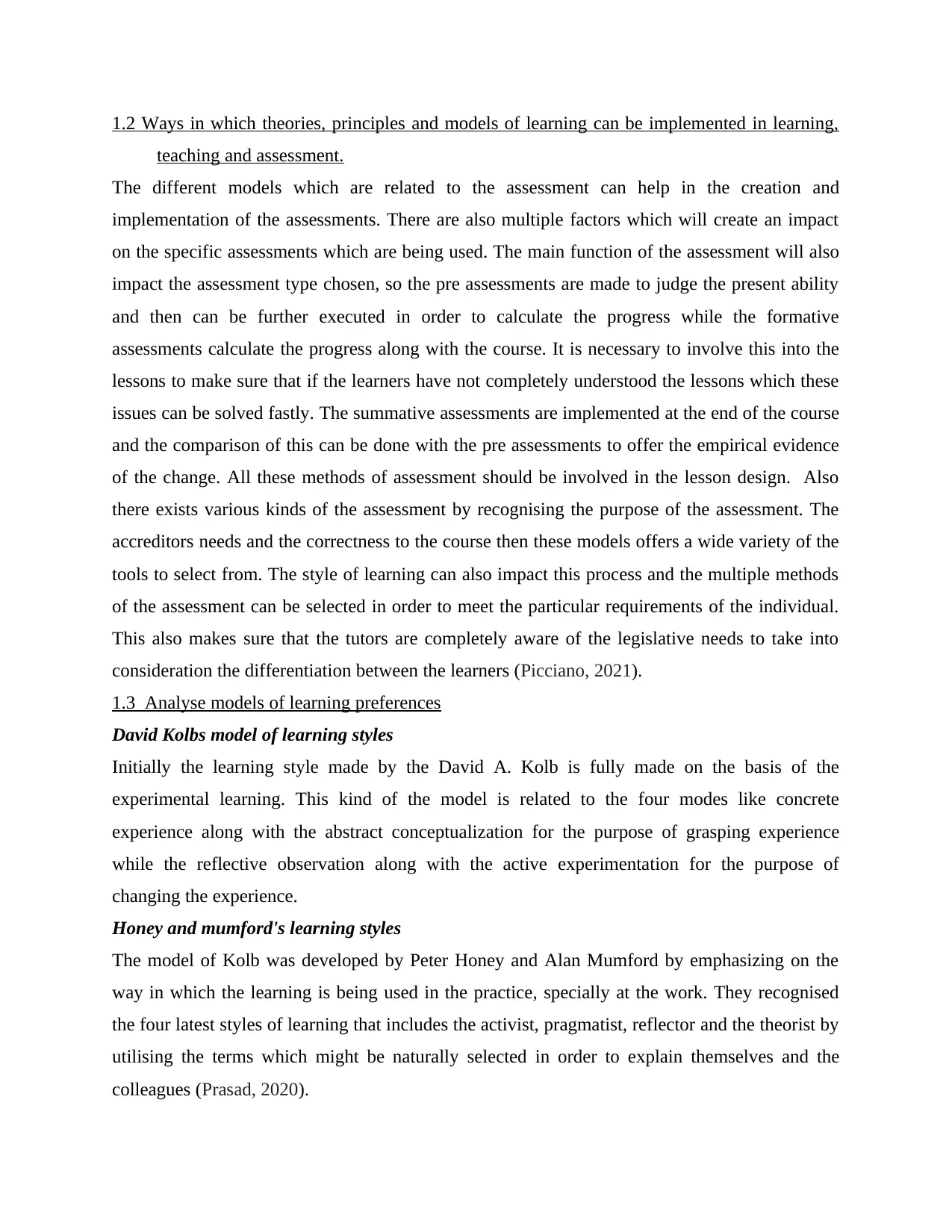
1.2 Ways in which theories, principles and models of learning can be implemented in learning,
teaching and assessment.
The different models which are related to the assessment can help in the creation and
implementation of the assessments. There are also multiple factors which will create an impact
on the specific assessments which are being used. The main function of the assessment will also
impact the assessment type chosen, so the pre assessments are made to judge the present ability
and then can be further executed in order to calculate the progress while the formative
assessments calculate the progress along with the course. It is necessary to involve this into the
lessons to make sure that if the learners have not completely understood the lessons which these
issues can be solved fastly. The summative assessments are implemented at the end of the course
and the comparison of this can be done with the pre assessments to offer the empirical evidence
of the change. All these methods of assessment should be involved in the lesson design. Also
there exists various kinds of the assessment by recognising the purpose of the assessment. The
accreditors needs and the correctness to the course then these models offers a wide variety of the
tools to select from. The style of learning can also impact this process and the multiple methods
of the assessment can be selected in order to meet the particular requirements of the individual.
This also makes sure that the tutors are completely aware of the legislative needs to take into
consideration the differentiation between the learners (Picciano, 2021).
1.3 Analyse models of learning preferences
David Kolbs model of learning styles
Initially the learning style made by the David A. Kolb is fully made on the basis of the
experimental learning. This kind of the model is related to the four modes like concrete
experience along with the abstract conceptualization for the purpose of grasping experience
while the reflective observation along with the active experimentation for the purpose of
changing the experience.
Honey and mumford's learning styles
The model of Kolb was developed by Peter Honey and Alan Mumford by emphasizing on the
way in which the learning is being used in the practice, specially at the work. They recognised
the four latest styles of learning that includes the activist, pragmatist, reflector and the theorist by
utilising the terms which might be naturally selected in order to explain themselves and the
colleagues (Prasad, 2020).
teaching and assessment.
The different models which are related to the assessment can help in the creation and
implementation of the assessments. There are also multiple factors which will create an impact
on the specific assessments which are being used. The main function of the assessment will also
impact the assessment type chosen, so the pre assessments are made to judge the present ability
and then can be further executed in order to calculate the progress while the formative
assessments calculate the progress along with the course. It is necessary to involve this into the
lessons to make sure that if the learners have not completely understood the lessons which these
issues can be solved fastly. The summative assessments are implemented at the end of the course
and the comparison of this can be done with the pre assessments to offer the empirical evidence
of the change. All these methods of assessment should be involved in the lesson design. Also
there exists various kinds of the assessment by recognising the purpose of the assessment. The
accreditors needs and the correctness to the course then these models offers a wide variety of the
tools to select from. The style of learning can also impact this process and the multiple methods
of the assessment can be selected in order to meet the particular requirements of the individual.
This also makes sure that the tutors are completely aware of the legislative needs to take into
consideration the differentiation between the learners (Picciano, 2021).
1.3 Analyse models of learning preferences
David Kolbs model of learning styles
Initially the learning style made by the David A. Kolb is fully made on the basis of the
experimental learning. This kind of the model is related to the four modes like concrete
experience along with the abstract conceptualization for the purpose of grasping experience
while the reflective observation along with the active experimentation for the purpose of
changing the experience.
Honey and mumford's learning styles
The model of Kolb was developed by Peter Honey and Alan Mumford by emphasizing on the
way in which the learning is being used in the practice, specially at the work. They recognised
the four latest styles of learning that includes the activist, pragmatist, reflector and the theorist by
utilising the terms which might be naturally selected in order to explain themselves and the
colleagues (Prasad, 2020).
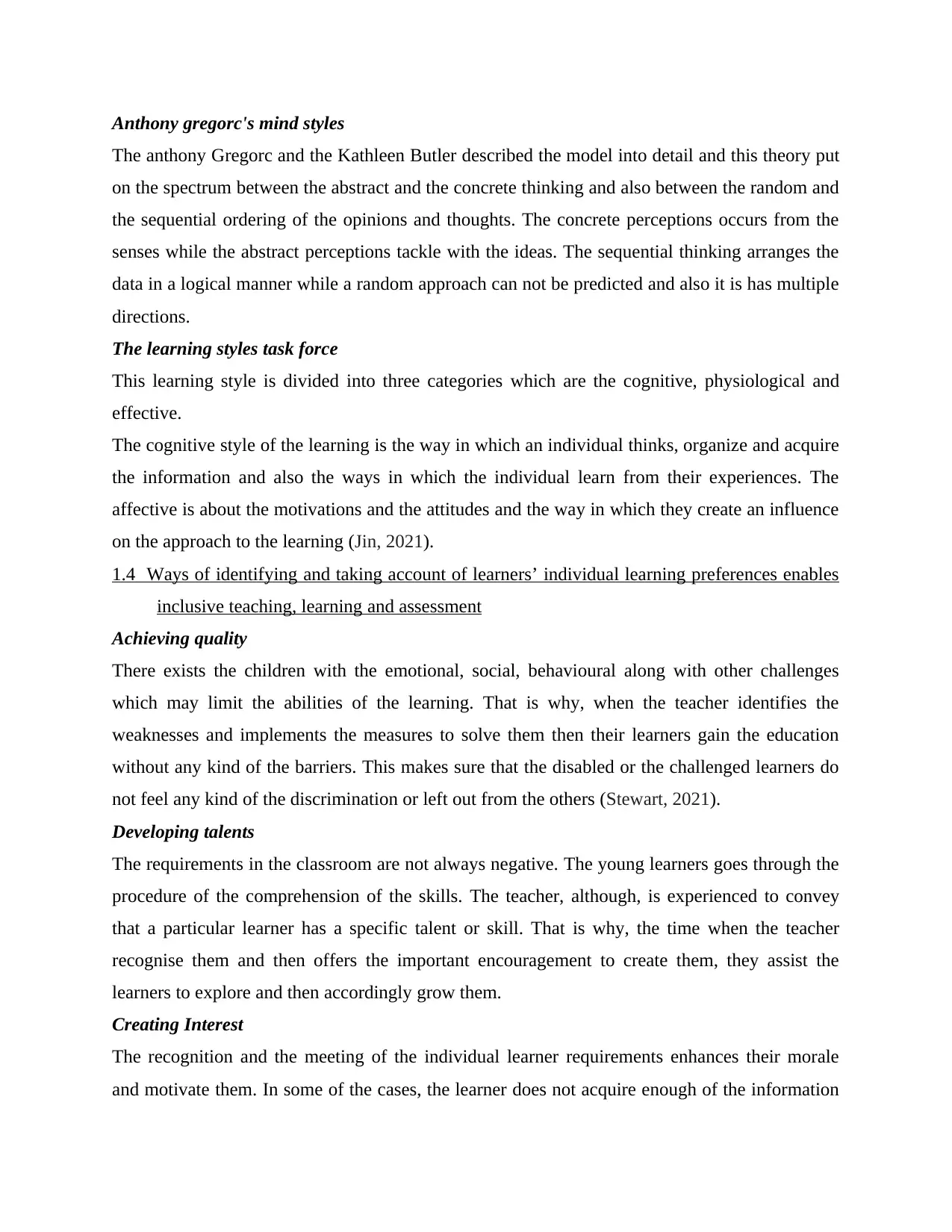
Anthony gregorc's mind styles
The anthony Gregorc and the Kathleen Butler described the model into detail and this theory put
on the spectrum between the abstract and the concrete thinking and also between the random and
the sequential ordering of the opinions and thoughts. The concrete perceptions occurs from the
senses while the abstract perceptions tackle with the ideas. The sequential thinking arranges the
data in a logical manner while a random approach can not be predicted and also it is has multiple
directions.
The learning styles task force
This learning style is divided into three categories which are the cognitive, physiological and
effective.
The cognitive style of the learning is the way in which an individual thinks, organize and acquire
the information and also the ways in which the individual learn from their experiences. The
affective is about the motivations and the attitudes and the way in which they create an influence
on the approach to the learning (Jin, 2021).
1.4 Ways of identifying and taking account of learners’ individual learning preferences enables
inclusive teaching, learning and assessment
Achieving quality
There exists the children with the emotional, social, behavioural along with other challenges
which may limit the abilities of the learning. That is why, when the teacher identifies the
weaknesses and implements the measures to solve them then their learners gain the education
without any kind of the barriers. This makes sure that the disabled or the challenged learners do
not feel any kind of the discrimination or left out from the others (Stewart, 2021).
Developing talents
The requirements in the classroom are not always negative. The young learners goes through the
procedure of the comprehension of the skills. The teacher, although, is experienced to convey
that a particular learner has a specific talent or skill. That is why, the time when the teacher
recognise them and then offers the important encouragement to create them, they assist the
learners to explore and then accordingly grow them.
Creating Interest
The recognition and the meeting of the individual learner requirements enhances their morale
and motivate them. In some of the cases, the learner does not acquire enough of the information
The anthony Gregorc and the Kathleen Butler described the model into detail and this theory put
on the spectrum between the abstract and the concrete thinking and also between the random and
the sequential ordering of the opinions and thoughts. The concrete perceptions occurs from the
senses while the abstract perceptions tackle with the ideas. The sequential thinking arranges the
data in a logical manner while a random approach can not be predicted and also it is has multiple
directions.
The learning styles task force
This learning style is divided into three categories which are the cognitive, physiological and
effective.
The cognitive style of the learning is the way in which an individual thinks, organize and acquire
the information and also the ways in which the individual learn from their experiences. The
affective is about the motivations and the attitudes and the way in which they create an influence
on the approach to the learning (Jin, 2021).
1.4 Ways of identifying and taking account of learners’ individual learning preferences enables
inclusive teaching, learning and assessment
Achieving quality
There exists the children with the emotional, social, behavioural along with other challenges
which may limit the abilities of the learning. That is why, when the teacher identifies the
weaknesses and implements the measures to solve them then their learners gain the education
without any kind of the barriers. This makes sure that the disabled or the challenged learners do
not feel any kind of the discrimination or left out from the others (Stewart, 2021).
Developing talents
The requirements in the classroom are not always negative. The young learners goes through the
procedure of the comprehension of the skills. The teacher, although, is experienced to convey
that a particular learner has a specific talent or skill. That is why, the time when the teacher
recognise them and then offers the important encouragement to create them, they assist the
learners to explore and then accordingly grow them.
Creating Interest
The recognition and the meeting of the individual learner requirements enhances their morale
and motivate them. In some of the cases, the learner does not acquire enough of the information
⊘ This is a preview!⊘
Do you want full access?
Subscribe today to unlock all pages.

Trusted by 1+ million students worldwide

from the group instruction. When the teacher offers the prescribed instruction on an individual
basis then it most essentially assists most learners to comprehend and learn the concepts related
to education (Van Ruler, 2018).
Planning classroom activities
The time when the teacher becomes known to the personal requirements of their learners then
they can plan out the daily activities of the classroom easily so that they can offer to all of them.
Task 2
2.1 Theories, principles and models of communication
Given below are some of the theories of communication
Transactional analysis- An individual conveys his thoughts and opinions in three states of ego
and can alter the ego state in just one interaction of the communication. These type of the states
are of the parent, adult and the child along with the ways in which an individual interacts parent
to parent, adult to adult and child to adult. Each state of the ego is associated to a specific
combination of the behaviours and thoughts. Although, for some of the learners it is not possible
to change from being the child because of going through the problems related to the mental
health.
Interactive- Communication can take place both in the form of verbally and non-verbally. The
process of communication includes the decoder and the encoder source. The source is the
originator of the message while the encoder and the decoder are the identity which is getting the
information and then answers with the feedback or source as an outcome of the feedback
develops the decoding that they gave. However this model states the way in which the
communication takes place does not provide the strategies to help in the process of
communication.
Linear- Communication is a procedure of transferring the message along with a meaning to
another although the receiver is capable to translate the message in their own way. This model is
appropriate to the kind of the learner that they have and however not being clear does not make
the idea that the message might not be translated as the intention of the receiver. This also makes
sure that the tutors are aware of what the individuals communicate is not always translated in the
way that they want to. That is why, the communication must be concise and clear and follow the
basis then it most essentially assists most learners to comprehend and learn the concepts related
to education (Van Ruler, 2018).
Planning classroom activities
The time when the teacher becomes known to the personal requirements of their learners then
they can plan out the daily activities of the classroom easily so that they can offer to all of them.
Task 2
2.1 Theories, principles and models of communication
Given below are some of the theories of communication
Transactional analysis- An individual conveys his thoughts and opinions in three states of ego
and can alter the ego state in just one interaction of the communication. These type of the states
are of the parent, adult and the child along with the ways in which an individual interacts parent
to parent, adult to adult and child to adult. Each state of the ego is associated to a specific
combination of the behaviours and thoughts. Although, for some of the learners it is not possible
to change from being the child because of going through the problems related to the mental
health.
Interactive- Communication can take place both in the form of verbally and non-verbally. The
process of communication includes the decoder and the encoder source. The source is the
originator of the message while the encoder and the decoder are the identity which is getting the
information and then answers with the feedback or source as an outcome of the feedback
develops the decoding that they gave. However this model states the way in which the
communication takes place does not provide the strategies to help in the process of
communication.
Linear- Communication is a procedure of transferring the message along with a meaning to
another although the receiver is capable to translate the message in their own way. This model is
appropriate to the kind of the learner that they have and however not being clear does not make
the idea that the message might not be translated as the intention of the receiver. This also makes
sure that the tutors are aware of what the individuals communicate is not always translated in the
way that they want to. That is why, the communication must be concise and clear and follow the
Paraphrase This Document
Need a fresh take? Get an instant paraphrase of this document with our AI Paraphraser
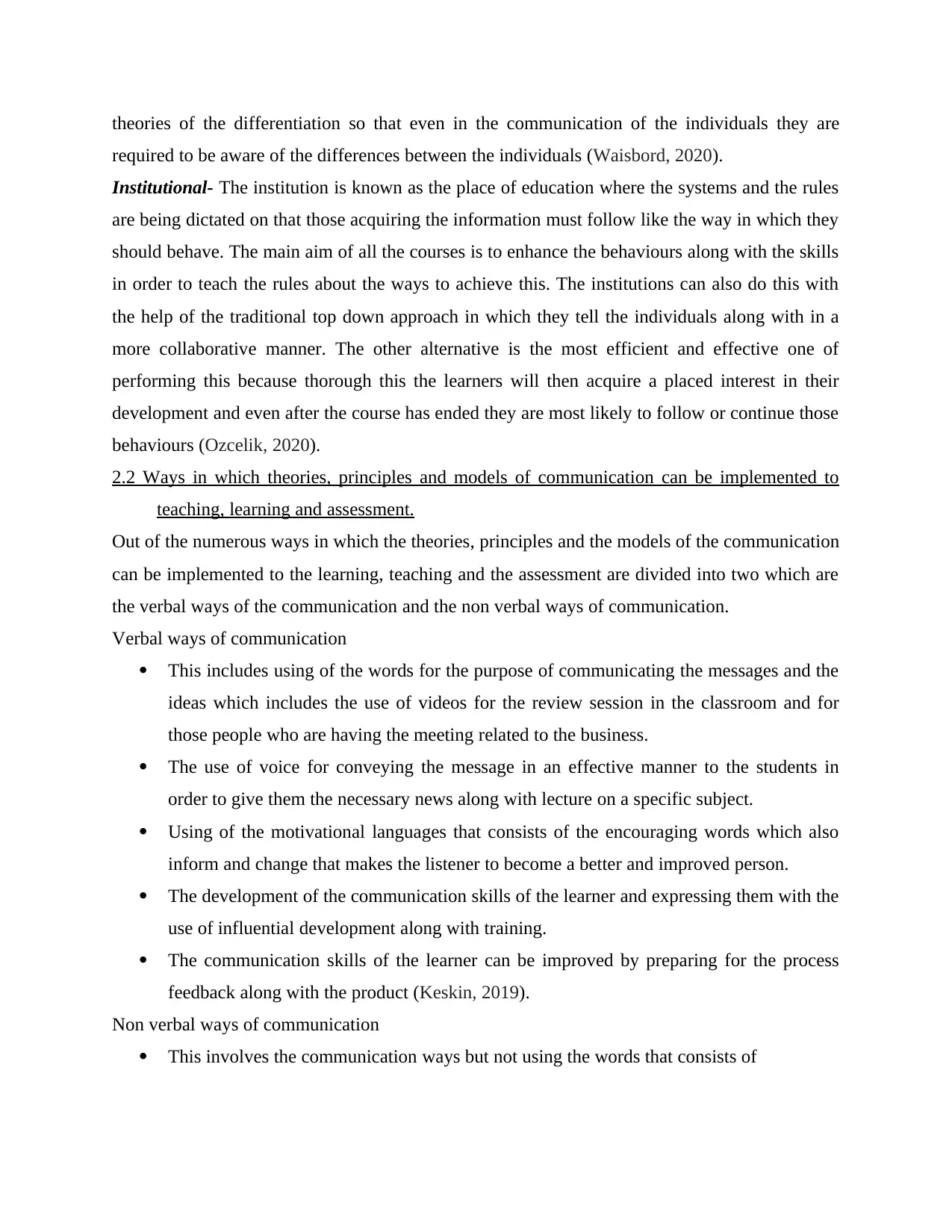
theories of the differentiation so that even in the communication of the individuals they are
required to be aware of the differences between the individuals (Waisbord, 2020).
Institutional- The institution is known as the place of education where the systems and the rules
are being dictated on that those acquiring the information must follow like the way in which they
should behave. The main aim of all the courses is to enhance the behaviours along with the skills
in order to teach the rules about the ways to achieve this. The institutions can also do this with
the help of the traditional top down approach in which they tell the individuals along with in a
more collaborative manner. The other alternative is the most efficient and effective one of
performing this because thorough this the learners will then acquire a placed interest in their
development and even after the course has ended they are most likely to follow or continue those
behaviours (Ozcelik, 2020).
2.2 Ways in which theories, principles and models of communication can be implemented to
teaching, learning and assessment.
Out of the numerous ways in which the theories, principles and the models of the communication
can be implemented to the learning, teaching and the assessment are divided into two which are
the verbal ways of the communication and the non verbal ways of communication.
Verbal ways of communication
This includes using of the words for the purpose of communicating the messages and the
ideas which includes the use of videos for the review session in the classroom and for
those people who are having the meeting related to the business.
The use of voice for conveying the message in an effective manner to the students in
order to give them the necessary news along with lecture on a specific subject.
Using of the motivational languages that consists of the encouraging words which also
inform and change that makes the listener to become a better and improved person.
The development of the communication skills of the learner and expressing them with the
use of influential development along with training.
The communication skills of the learner can be improved by preparing for the process
feedback along with the product (Keskin, 2019).
Non verbal ways of communication
This involves the communication ways but not using the words that consists of
required to be aware of the differences between the individuals (Waisbord, 2020).
Institutional- The institution is known as the place of education where the systems and the rules
are being dictated on that those acquiring the information must follow like the way in which they
should behave. The main aim of all the courses is to enhance the behaviours along with the skills
in order to teach the rules about the ways to achieve this. The institutions can also do this with
the help of the traditional top down approach in which they tell the individuals along with in a
more collaborative manner. The other alternative is the most efficient and effective one of
performing this because thorough this the learners will then acquire a placed interest in their
development and even after the course has ended they are most likely to follow or continue those
behaviours (Ozcelik, 2020).
2.2 Ways in which theories, principles and models of communication can be implemented to
teaching, learning and assessment.
Out of the numerous ways in which the theories, principles and the models of the communication
can be implemented to the learning, teaching and the assessment are divided into two which are
the verbal ways of the communication and the non verbal ways of communication.
Verbal ways of communication
This includes using of the words for the purpose of communicating the messages and the
ideas which includes the use of videos for the review session in the classroom and for
those people who are having the meeting related to the business.
The use of voice for conveying the message in an effective manner to the students in
order to give them the necessary news along with lecture on a specific subject.
Using of the motivational languages that consists of the encouraging words which also
inform and change that makes the listener to become a better and improved person.
The development of the communication skills of the learner and expressing them with the
use of influential development along with training.
The communication skills of the learner can be improved by preparing for the process
feedback along with the product (Keskin, 2019).
Non verbal ways of communication
This involves the communication ways but not using the words that consists of
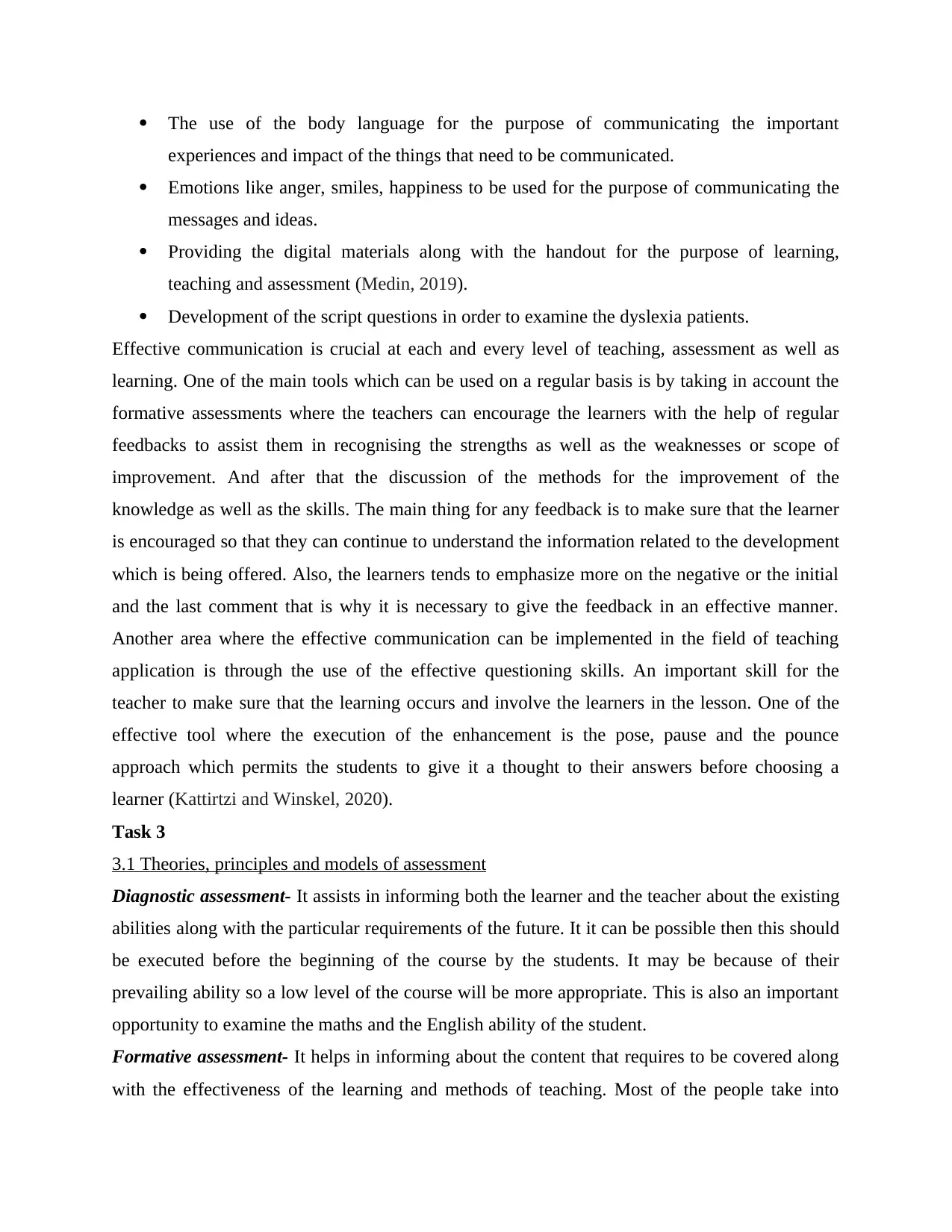
The use of the body language for the purpose of communicating the important
experiences and impact of the things that need to be communicated.
Emotions like anger, smiles, happiness to be used for the purpose of communicating the
messages and ideas.
Providing the digital materials along with the handout for the purpose of learning,
teaching and assessment (Medin, 2019).
Development of the script questions in order to examine the dyslexia patients.
Effective communication is crucial at each and every level of teaching, assessment as well as
learning. One of the main tools which can be used on a regular basis is by taking in account the
formative assessments where the teachers can encourage the learners with the help of regular
feedbacks to assist them in recognising the strengths as well as the weaknesses or scope of
improvement. And after that the discussion of the methods for the improvement of the
knowledge as well as the skills. The main thing for any feedback is to make sure that the learner
is encouraged so that they can continue to understand the information related to the development
which is being offered. Also, the learners tends to emphasize more on the negative or the initial
and the last comment that is why it is necessary to give the feedback in an effective manner.
Another area where the effective communication can be implemented in the field of teaching
application is through the use of the effective questioning skills. An important skill for the
teacher to make sure that the learning occurs and involve the learners in the lesson. One of the
effective tool where the execution of the enhancement is the pose, pause and the pounce
approach which permits the students to give it a thought to their answers before choosing a
learner (Kattirtzi and Winskel, 2020).
Task 3
3.1 Theories, principles and models of assessment
Diagnostic assessment- It assists in informing both the learner and the teacher about the existing
abilities along with the particular requirements of the future. It it can be possible then this should
be executed before the beginning of the course by the students. It may be because of their
prevailing ability so a low level of the course will be more appropriate. This is also an important
opportunity to examine the maths and the English ability of the student.
Formative assessment- It helps in informing about the content that requires to be covered along
with the effectiveness of the learning and methods of teaching. Most of the people take into
experiences and impact of the things that need to be communicated.
Emotions like anger, smiles, happiness to be used for the purpose of communicating the
messages and ideas.
Providing the digital materials along with the handout for the purpose of learning,
teaching and assessment (Medin, 2019).
Development of the script questions in order to examine the dyslexia patients.
Effective communication is crucial at each and every level of teaching, assessment as well as
learning. One of the main tools which can be used on a regular basis is by taking in account the
formative assessments where the teachers can encourage the learners with the help of regular
feedbacks to assist them in recognising the strengths as well as the weaknesses or scope of
improvement. And after that the discussion of the methods for the improvement of the
knowledge as well as the skills. The main thing for any feedback is to make sure that the learner
is encouraged so that they can continue to understand the information related to the development
which is being offered. Also, the learners tends to emphasize more on the negative or the initial
and the last comment that is why it is necessary to give the feedback in an effective manner.
Another area where the effective communication can be implemented in the field of teaching
application is through the use of the effective questioning skills. An important skill for the
teacher to make sure that the learning occurs and involve the learners in the lesson. One of the
effective tool where the execution of the enhancement is the pose, pause and the pounce
approach which permits the students to give it a thought to their answers before choosing a
learner (Kattirtzi and Winskel, 2020).
Task 3
3.1 Theories, principles and models of assessment
Diagnostic assessment- It assists in informing both the learner and the teacher about the existing
abilities along with the particular requirements of the future. It it can be possible then this should
be executed before the beginning of the course by the students. It may be because of their
prevailing ability so a low level of the course will be more appropriate. This is also an important
opportunity to examine the maths and the English ability of the student.
Formative assessment- It helps in informing about the content that requires to be covered along
with the effectiveness of the learning and methods of teaching. Most of the people take into
⊘ This is a preview!⊘
Do you want full access?
Subscribe today to unlock all pages.

Trusted by 1+ million students worldwide
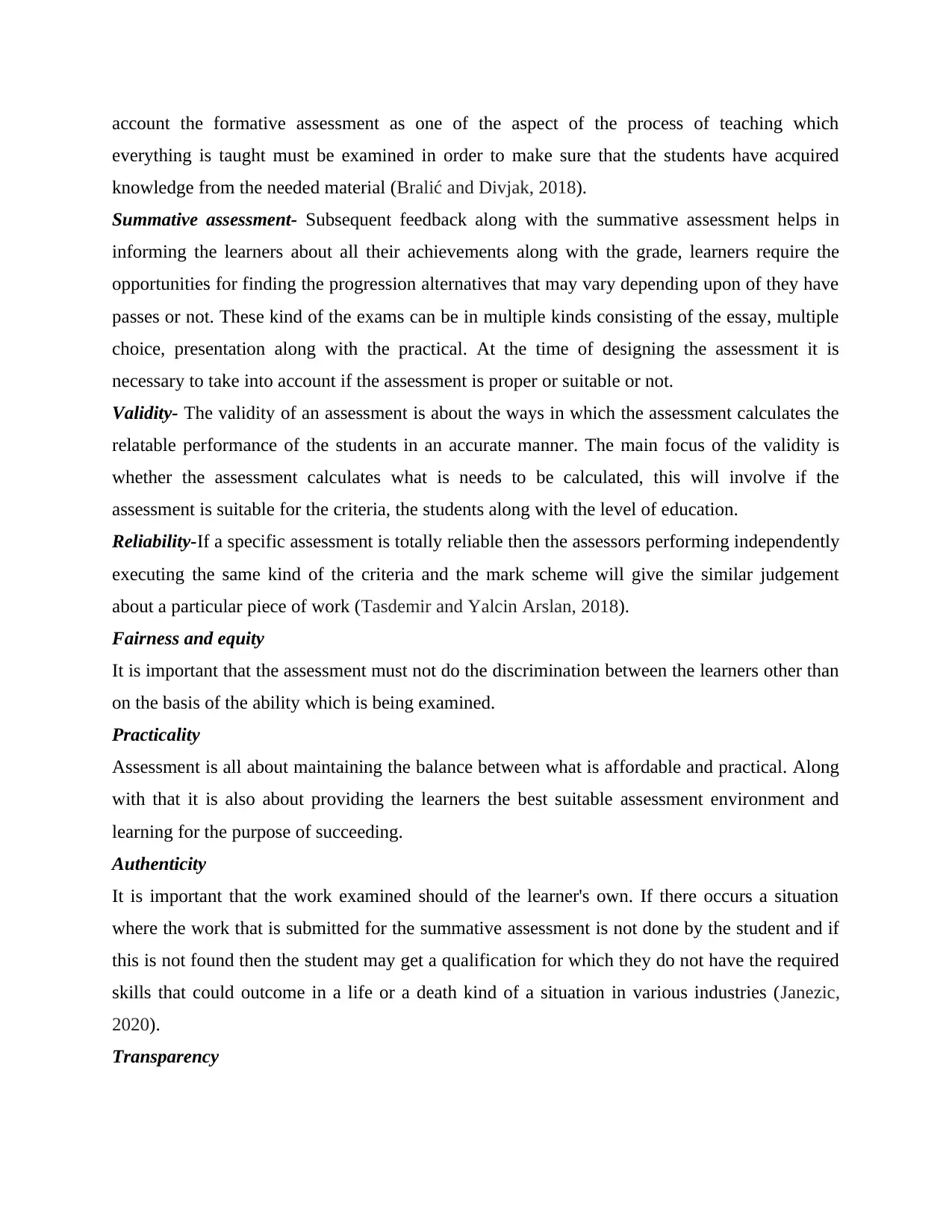
account the formative assessment as one of the aspect of the process of teaching which
everything is taught must be examined in order to make sure that the students have acquired
knowledge from the needed material (Bralić and Divjak, 2018).
Summative assessment- Subsequent feedback along with the summative assessment helps in
informing the learners about all their achievements along with the grade, learners require the
opportunities for finding the progression alternatives that may vary depending upon of they have
passes or not. These kind of the exams can be in multiple kinds consisting of the essay, multiple
choice, presentation along with the practical. At the time of designing the assessment it is
necessary to take into account if the assessment is proper or suitable or not.
Validity- The validity of an assessment is about the ways in which the assessment calculates the
relatable performance of the students in an accurate manner. The main focus of the validity is
whether the assessment calculates what is needs to be calculated, this will involve if the
assessment is suitable for the criteria, the students along with the level of education.
Reliability-If a specific assessment is totally reliable then the assessors performing independently
executing the same kind of the criteria and the mark scheme will give the similar judgement
about a particular piece of work (Tasdemir and Yalcin Arslan, 2018).
Fairness and equity
It is important that the assessment must not do the discrimination between the learners other than
on the basis of the ability which is being examined.
Practicality
Assessment is all about maintaining the balance between what is affordable and practical. Along
with that it is also about providing the learners the best suitable assessment environment and
learning for the purpose of succeeding.
Authenticity
It is important that the work examined should of the learner's own. If there occurs a situation
where the work that is submitted for the summative assessment is not done by the student and if
this is not found then the student may get a qualification for which they do not have the required
skills that could outcome in a life or a death kind of a situation in various industries (Janezic,
2020).
Transparency
everything is taught must be examined in order to make sure that the students have acquired
knowledge from the needed material (Bralić and Divjak, 2018).
Summative assessment- Subsequent feedback along with the summative assessment helps in
informing the learners about all their achievements along with the grade, learners require the
opportunities for finding the progression alternatives that may vary depending upon of they have
passes or not. These kind of the exams can be in multiple kinds consisting of the essay, multiple
choice, presentation along with the practical. At the time of designing the assessment it is
necessary to take into account if the assessment is proper or suitable or not.
Validity- The validity of an assessment is about the ways in which the assessment calculates the
relatable performance of the students in an accurate manner. The main focus of the validity is
whether the assessment calculates what is needs to be calculated, this will involve if the
assessment is suitable for the criteria, the students along with the level of education.
Reliability-If a specific assessment is totally reliable then the assessors performing independently
executing the same kind of the criteria and the mark scheme will give the similar judgement
about a particular piece of work (Tasdemir and Yalcin Arslan, 2018).
Fairness and equity
It is important that the assessment must not do the discrimination between the learners other than
on the basis of the ability which is being examined.
Practicality
Assessment is all about maintaining the balance between what is affordable and practical. Along
with that it is also about providing the learners the best suitable assessment environment and
learning for the purpose of succeeding.
Authenticity
It is important that the work examined should of the learner's own. If there occurs a situation
where the work that is submitted for the summative assessment is not done by the student and if
this is not found then the student may get a qualification for which they do not have the required
skills that could outcome in a life or a death kind of a situation in various industries (Janezic,
2020).
Transparency
Paraphrase This Document
Need a fresh take? Get an instant paraphrase of this document with our AI Paraphraser
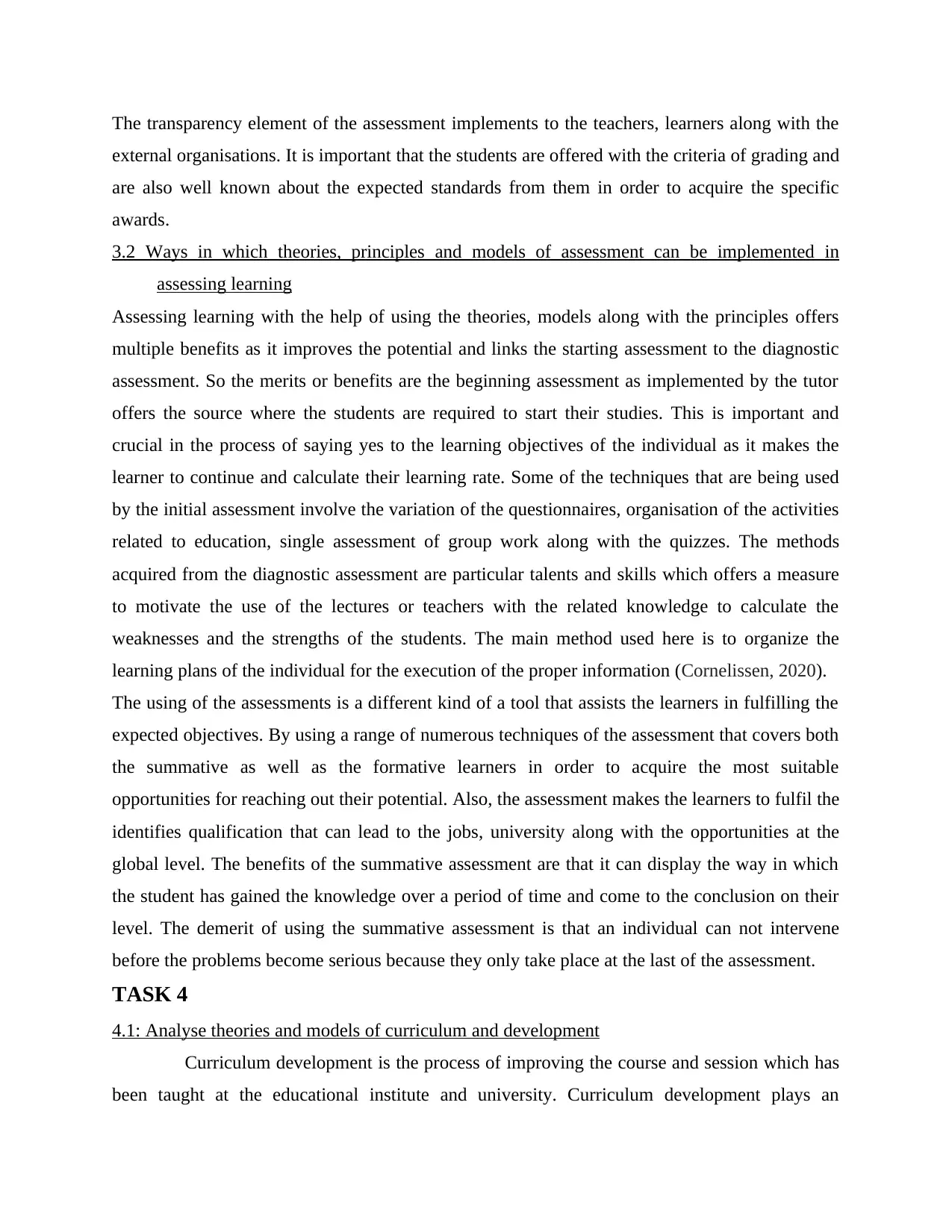
The transparency element of the assessment implements to the teachers, learners along with the
external organisations. It is important that the students are offered with the criteria of grading and
are also well known about the expected standards from them in order to acquire the specific
awards.
3.2 Ways in which theories, principles and models of assessment can be implemented in
assessing learning
Assessing learning with the help of using the theories, models along with the principles offers
multiple benefits as it improves the potential and links the starting assessment to the diagnostic
assessment. So the merits or benefits are the beginning assessment as implemented by the tutor
offers the source where the students are required to start their studies. This is important and
crucial in the process of saying yes to the learning objectives of the individual as it makes the
learner to continue and calculate their learning rate. Some of the techniques that are being used
by the initial assessment involve the variation of the questionnaires, organisation of the activities
related to education, single assessment of group work along with the quizzes. The methods
acquired from the diagnostic assessment are particular talents and skills which offers a measure
to motivate the use of the lectures or teachers with the related knowledge to calculate the
weaknesses and the strengths of the students. The main method used here is to organize the
learning plans of the individual for the execution of the proper information (Cornelissen, 2020).
The using of the assessments is a different kind of a tool that assists the learners in fulfilling the
expected objectives. By using a range of numerous techniques of the assessment that covers both
the summative as well as the formative learners in order to acquire the most suitable
opportunities for reaching out their potential. Also, the assessment makes the learners to fulfil the
identifies qualification that can lead to the jobs, university along with the opportunities at the
global level. The benefits of the summative assessment are that it can display the way in which
the student has gained the knowledge over a period of time and come to the conclusion on their
level. The demerit of using the summative assessment is that an individual can not intervene
before the problems become serious because they only take place at the last of the assessment.
TASK 4
4.1: Analyse theories and models of curriculum and development
Curriculum development is the process of improving the course and session which has
been taught at the educational institute and university. Curriculum development plays an
external organisations. It is important that the students are offered with the criteria of grading and
are also well known about the expected standards from them in order to acquire the specific
awards.
3.2 Ways in which theories, principles and models of assessment can be implemented in
assessing learning
Assessing learning with the help of using the theories, models along with the principles offers
multiple benefits as it improves the potential and links the starting assessment to the diagnostic
assessment. So the merits or benefits are the beginning assessment as implemented by the tutor
offers the source where the students are required to start their studies. This is important and
crucial in the process of saying yes to the learning objectives of the individual as it makes the
learner to continue and calculate their learning rate. Some of the techniques that are being used
by the initial assessment involve the variation of the questionnaires, organisation of the activities
related to education, single assessment of group work along with the quizzes. The methods
acquired from the diagnostic assessment are particular talents and skills which offers a measure
to motivate the use of the lectures or teachers with the related knowledge to calculate the
weaknesses and the strengths of the students. The main method used here is to organize the
learning plans of the individual for the execution of the proper information (Cornelissen, 2020).
The using of the assessments is a different kind of a tool that assists the learners in fulfilling the
expected objectives. By using a range of numerous techniques of the assessment that covers both
the summative as well as the formative learners in order to acquire the most suitable
opportunities for reaching out their potential. Also, the assessment makes the learners to fulfil the
identifies qualification that can lead to the jobs, university along with the opportunities at the
global level. The benefits of the summative assessment are that it can display the way in which
the student has gained the knowledge over a period of time and come to the conclusion on their
level. The demerit of using the summative assessment is that an individual can not intervene
before the problems become serious because they only take place at the last of the assessment.
TASK 4
4.1: Analyse theories and models of curriculum and development
Curriculum development is the process of improving the course and session which has
been taught at the educational institute and university. Curriculum development plays an
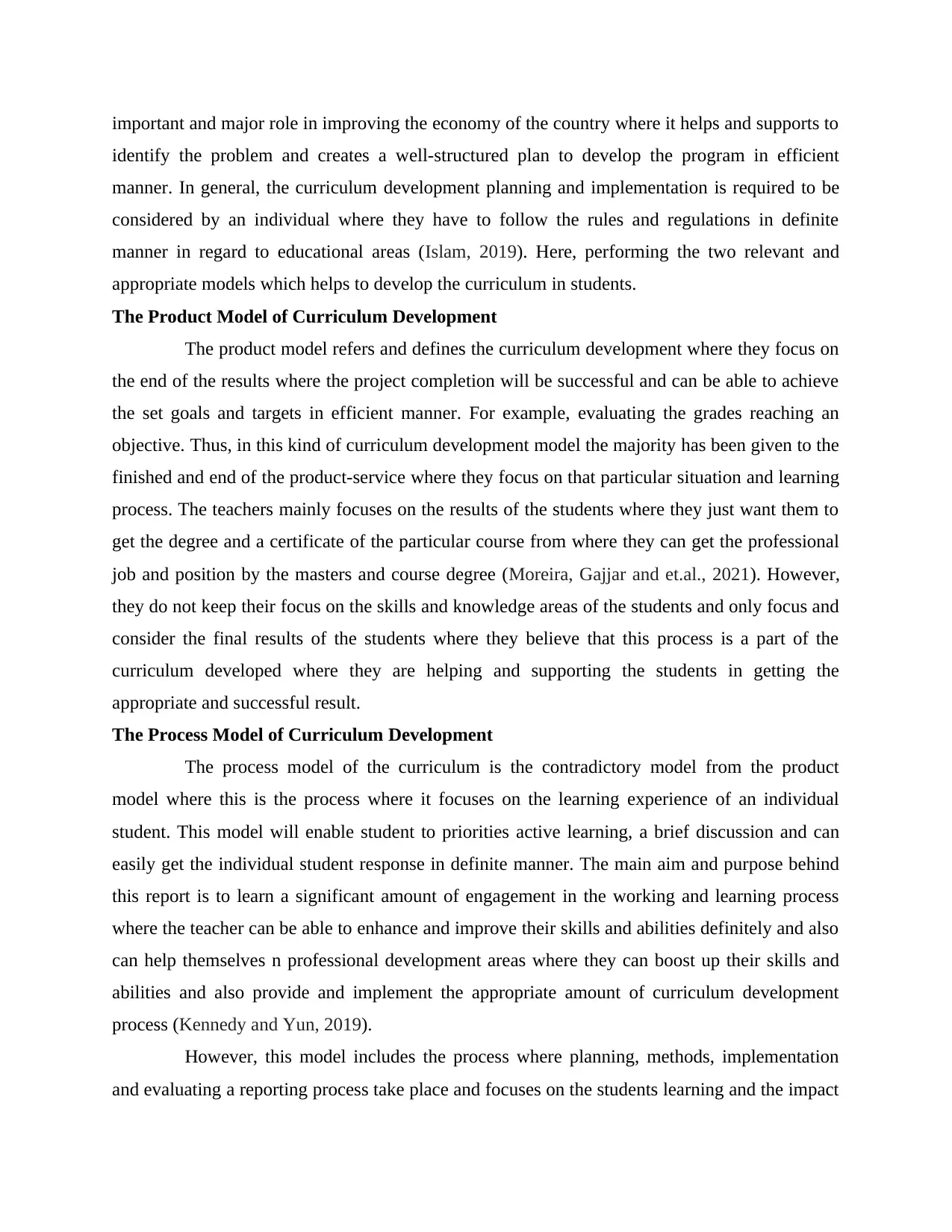
important and major role in improving the economy of the country where it helps and supports to
identify the problem and creates a well-structured plan to develop the program in efficient
manner. In general, the curriculum development planning and implementation is required to be
considered by an individual where they have to follow the rules and regulations in definite
manner in regard to educational areas (Islam, 2019). Here, performing the two relevant and
appropriate models which helps to develop the curriculum in students.
The Product Model of Curriculum Development
The product model refers and defines the curriculum development where they focus on
the end of the results where the project completion will be successful and can be able to achieve
the set goals and targets in efficient manner. For example, evaluating the grades reaching an
objective. Thus, in this kind of curriculum development model the majority has been given to the
finished and end of the product-service where they focus on that particular situation and learning
process. The teachers mainly focuses on the results of the students where they just want them to
get the degree and a certificate of the particular course from where they can get the professional
job and position by the masters and course degree (Moreira, Gajjar and et.al., 2021). However,
they do not keep their focus on the skills and knowledge areas of the students and only focus and
consider the final results of the students where they believe that this process is a part of the
curriculum developed where they are helping and supporting the students in getting the
appropriate and successful result.
The Process Model of Curriculum Development
The process model of the curriculum is the contradictory model from the product
model where this is the process where it focuses on the learning experience of an individual
student. This model will enable student to priorities active learning, a brief discussion and can
easily get the individual student response in definite manner. The main aim and purpose behind
this report is to learn a significant amount of engagement in the working and learning process
where the teacher can be able to enhance and improve their skills and abilities definitely and also
can help themselves n professional development areas where they can boost up their skills and
abilities and also provide and implement the appropriate amount of curriculum development
process (Kennedy and Yun, 2019).
However, this model includes the process where planning, methods, implementation
and evaluating a reporting process take place and focuses on the students learning and the impact
identify the problem and creates a well-structured plan to develop the program in efficient
manner. In general, the curriculum development planning and implementation is required to be
considered by an individual where they have to follow the rules and regulations in definite
manner in regard to educational areas (Islam, 2019). Here, performing the two relevant and
appropriate models which helps to develop the curriculum in students.
The Product Model of Curriculum Development
The product model refers and defines the curriculum development where they focus on
the end of the results where the project completion will be successful and can be able to achieve
the set goals and targets in efficient manner. For example, evaluating the grades reaching an
objective. Thus, in this kind of curriculum development model the majority has been given to the
finished and end of the product-service where they focus on that particular situation and learning
process. The teachers mainly focuses on the results of the students where they just want them to
get the degree and a certificate of the particular course from where they can get the professional
job and position by the masters and course degree (Moreira, Gajjar and et.al., 2021). However,
they do not keep their focus on the skills and knowledge areas of the students and only focus and
consider the final results of the students where they believe that this process is a part of the
curriculum developed where they are helping and supporting the students in getting the
appropriate and successful result.
The Process Model of Curriculum Development
The process model of the curriculum is the contradictory model from the product
model where this is the process where it focuses on the learning experience of an individual
student. This model will enable student to priorities active learning, a brief discussion and can
easily get the individual student response in definite manner. The main aim and purpose behind
this report is to learn a significant amount of engagement in the working and learning process
where the teacher can be able to enhance and improve their skills and abilities definitely and also
can help themselves n professional development areas where they can boost up their skills and
abilities and also provide and implement the appropriate amount of curriculum development
process (Kennedy and Yun, 2019).
However, this model includes the process where planning, methods, implementation
and evaluating a reporting process take place and focuses on the students learning and the impact
⊘ This is a preview!⊘
Do you want full access?
Subscribe today to unlock all pages.

Trusted by 1+ million students worldwide
1 out of 19
Related Documents
Your All-in-One AI-Powered Toolkit for Academic Success.
+13062052269
info@desklib.com
Available 24*7 on WhatsApp / Email
![[object Object]](/_next/static/media/star-bottom.7253800d.svg)
Unlock your academic potential
Copyright © 2020–2026 A2Z Services. All Rights Reserved. Developed and managed by ZUCOL.



